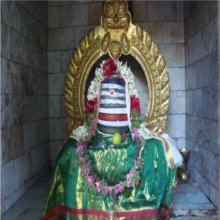Gurupuja, Gurupūjā, Guru-puja, Gurupujā: 9 definitions
Introduction:
Gurupuja means something in Hinduism, Sanskrit, Marathi. If you want to know the exact meaning, history, etymology or English translation of this term then check out the descriptions on this page. Add your comment or reference to a book if you want to contribute to this summary article.
Images (photo gallery)
In Hinduism
Purana and Itihasa (epic history)
Source: archive.org: Shiva Purana - English TranslationGurupūjā (गुरुपूजा) refers to “worship of the preceptor”, as mentioned in the Śivapurāṇa 1.18.—Accordingly, “the modes of worship of the preceptor are many. He can be given monetary gifts. He can be physically served but the money shall be what is earned by the disciple. Since every limb of the preceptor is a phallus from toe to the head, massaging the feet, presenting him with sandals, bathing him, offering food and money and similar rites shall be performed to gratify him. Verily the worship of the preceptor (gurupūjā) is worship of Śiva, the supreme soul. What remains after the preceptor has partaken of food shall be used by the disciple. It will purify him. Just as Siva’s leaving of food can be taken by the devotee of Śiva, so also the disciple can take the leavings of the preceptor. Even food and water, O brahmins.”.

The Purana (पुराण, purāṇas) refers to Sanskrit literature preserving ancient India’s vast cultural history, including historical legends, religious ceremonies, various arts and sciences. The eighteen mahapuranas total over 400,000 shlokas (metrical couplets) and date to at least several centuries BCE.
Shaktism (Shakta philosophy)
Source: Google Books: ManthanabhairavatantramGurupūjā (गुरुपूजा) refers to “worshipping the teacher”, according to the Manthānabhairavatantra, a vast sprawling work that belongs to a corpus of Tantric texts concerned with the worship of the goddess Kubjikā.—Accordingly, “May they, whom I have recollected and are satisfied, accept the vessel of the bali. [...] Accompanied by Śrīnātha, they bestow boons and fame (prasiddhi). O god, they bestow gifts and accomplishments to those who are devoted to the teaching and worshipping the teacher and to those engaged in the practice (of consuming) the sacrificial pap”.

Shakta (शाक्त, śākta) or Shaktism (śāktism) represents a tradition of Hinduism where the Goddess (Devi) is revered and worshipped. Shakta literature includes a range of scriptures, including various Agamas and Tantras, although its roots may be traced back to the Vedas.
Shaivism (Shaiva philosophy)
Source: Brill: Śaivism and the Tantric Traditions1) Gurupūjā (गुरुपूजा) [=Gurupūjaka?] refers to the “veneration of one’s Guru”, according to the 9th-century Sarvajñānottaratantra chapter 18.—Accordingly, “Next, I shall teach the best observance among observances, which is known as the Śiva-vrata and which is revered by Asuras and Gods alike. Pure pale ash [should be used, and] white dress and unguents; he should wear a white sacred thread and be adorned by a chignon of matted locks. He should be equipped with all [suitable] ornaments, [and] adorned with white garlands; he should consume [only the pure ritual gruel-offering known as] caru; he should observe the chaste conduct of a student; he should venerate Śiva, the fire and his Guru (gurupūjaka—śivāgnigurupūjakaḥ). [...]”.
2) Gurupūjā (गुरुपूजा) refers to the “worship of his guru”, according to the 13th-century Matsyendrasaṃhitā: a Kubjikā-Tripurā oriented Tantric Yoga text of the Ṣaḍanvayaśāmbhava tradition from South India.—Accordingly, “The Yogin who is engaged in the worship of his guru (gurupūjā-rata) can obtain the highest Power (siddhi). The guru’s bedstead, his bedding, clothes, ornaments, sandals, parasol, antilope-skin, bowl or anything else: if he touches any of these with his feet, he should place them on his head and recite [mantras] eight times. [...]”.

Shaiva (शैव, śaiva) or Shaivism (śaivism) represents a tradition of Hinduism worshiping Shiva as the supreme being. Closely related to Shaktism, Shaiva literature includes a range of scriptures, including Tantras, while the root of this tradition may be traced back to the ancient Vedas.
Languages of India and abroad
Marathi-English dictionary
Source: DDSA: The Molesworth Marathi and English Dictionarygurupūjā (गुरुपूजा).—f (S) The ceremonies in propitiation of Guru (Regent of Jupiter), when a work is to be performed or undertaken. 2 Worship (on the full moon of āṣāḍha) of one's spiritual guide, or of the Sanyasis of the village, or of the head-Brahman.
Marathi is an Indo-European language having over 70 million native speakers people in (predominantly) Maharashtra India. Marathi, like many other Indo-Aryan languages, evolved from early forms of Prakrit, which itself is a subset of Sanskrit, one of the most ancient languages of the world.
Sanskrit dictionary
Source: DDSA: The practical Sanskrit-English dictionaryGurupūjā (गुरुपूजा).—
1) the ceremonies in propitiation of Bṛhaspati when a work is to be performed or undertaken.
2) the worship of one's spiritual preceptor.
Gurupūjā is a Sanskrit compound consisting of the terms guru and pūjā (पूजा).
Source: Cologne Digital Sanskrit Dictionaries: Cappeller Sanskrit-English DictionaryGurupūjā (गुरुपूजा).—[feminine] reverence towards the teacher.
Source: Cologne Digital Sanskrit Dictionaries: Aufrecht Catalogus Catalogorum1) Gurupūjā (गुरुपूजा) as mentioned in Aufrecht’s Catalogus Catalogorum:—W. p. 352. Rādh. 26.
2) Gurupūjā (गुरुपूजा):—As p. 187.
Source: Cologne Digital Sanskrit Dictionaries: Monier-Williams Sanskrit-English Dictionary1) Gurupūjā (गुरुपूजा):—[=guru-pūjā] [from guru] f. the worship of one’s spiritual teacher, [Varāha-mihira’s Yogayātrā iv, 40]
2) [v.s. ...] the ceremonies in propitiation of Bṛhaspati when a work is to be performed or undertaken, [Horace H. Wilson]
[Sanskrit to German]
Sanskrit, also spelled संस्कृतम् (saṃskṛtam), is an ancient language of India commonly seen as the grandmother of the Indo-European language family (even English!). Closely allied with Prakrit and Pali, Sanskrit is more exhaustive in both grammar and terms and has the most extensive collection of literature in the world, greatly surpassing its sister-languages Greek and Latin.
See also (Relevant definitions)
Starts with: Gurupujaka, Gurupujakrama, Gurupujapaddhati, Gurupujarahasya.
Full-text: Gurushushrusha, Atimanasa-kosha, Siddhananda, Gurupujaka, Puja.
Relevant text
Search found 4 books and stories containing Gurupuja, Gurupūjā, Guru-puja, Gurupujā, Guru-pūjā; (plurals include: Gurupujas, Gurupūjās, pujas, Gurupujās, pūjās). You can also click to the full overview containing English textual excerpts. Below are direct links for the most relevant articles:
Srila Gurudeva (The Supreme Treasure) (by Swami Bhaktivedanta Madhava Maharaja)
Vyāsa-pūjā of the Bona Fide Guru < [Chapter 1.1 - Śrī Guru Tattva and Śrī Guru Sevaka]
Residing in the Abode of Separation (Śrī Jaganntha Purī-dhāma) < [Chapter 2.19 - The Concluding Transcendental Pastimes]
Trishashti Shalaka Purusha Caritra (by Helen M. Johnson)
The six daily duties < [Notes]
Chaitanya Bhagavata (by Bhumipati Dāsa)
Verse 2.5.8 < [Chapter 5 - Lord Nityānanda’s Vyāsa-pūjā Ceremony and His Darśana of the Lord’s Six-armed Form]
Bhajana-Rahasya (by Srila Bhaktivinoda Thakura Mahasaya)


